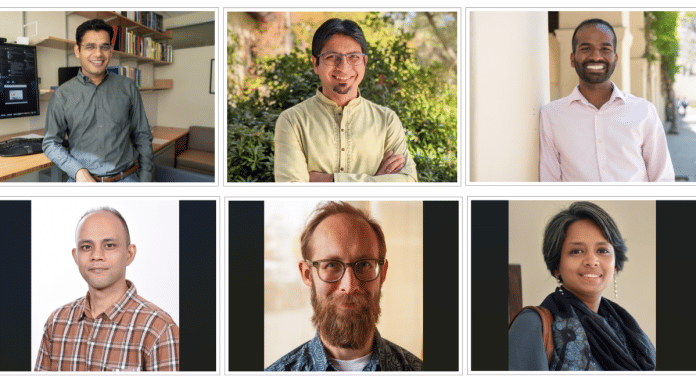New Delhi: The Infosys Science Foundation on Wednesday announced the six winners of the Infosys Prize 2025, facilitating scholars from a range of fields such as engineering, life sciences, and humanities. The 17th edition of the awards recognised contributions by a scholar of Prakrit languages, a professor who found out unique ways of DNA repair, and an engineer who designed new models of mathematical machine learning, among others.
The annual award includes a citation, a gold medal, and a prize purse of $100,000. The awards were announced by Infosys founder Narayana Murthy, at the Infosys Science Foundation in Jayanagar, Bangalore, and the awardees were contacted virtually. The official awards ceremony will take place in January.
Along with the age requirement of being under 40, the award also requires that the winners that are not based in India should spend 30 days in an Indian institution of their choice, within one year of the announcement. The Infosys Foundation, in its statute for the Prize, said it will host the travel and accommodation of the awardees.
K Dinesh, President, Board of Trustees, Infosys Science Foundation, in his opening remarks at the announcement ceremony, spoke about the importance of practical research in India.
“Our scientists need to seek a purpose for why they’re doing research, and not just chase success,” he said. “They need to find a balance between the societal impact of their innovation and also the success they’ll achieve with it.”
Humanities and Social Sciences Award
Andrew Ollett, associate professor at the University of Chicago, received the Infosys Prize for Humanities and Social Sciences for his pioneering work as a scholar of the ancient Indian group of languages called Prakrit.
The 39-year-old scholar works at the Department of South Asian Languages and Civilisations in the University of Chicago, and has done extensive research in the study of Prakrit, Sanskrit, Kannada, Tamil and even Chinese. His book, titled Language of the Snakes, was published in 2017, and is an account of the cultural roles of the Prakrit group of languages, spoken in India between the 5th and 12th century CE, in shaping Indian culture and other languages like Sanskrit and modern Indian languages too.
The Infosys statement said that Ollett is the “world’s foremost scholar of the Prakrit languages in this generation.”
Life sciences award
The Infosys Prize for Life Sciences in 2025 went to Anjana Badrinarayanan, who is an Associate Professor at the National Centre for Biological Sciences (NCBS), Bangalore. Her work revolves around DNA damage and repair, and understanding the mechanisms by which cells conduct this maintenance.
Badrinarayanan uses a unique ‘live imaging technique’ where scientists are able to observe the process by which cells grow and function in real time. This helped her identify newer ways in which DNA and other damages are repaired in different parts of the cell. She was awarded the Infosys Prize because her work advanced the field of genomics and microbial biology.
Economics award
In economics this year, the Infosys Science Foundation decided to award Nikhil Agrawal, a Paul A. Samuelson Professor of Economics at Massachusetts Institute of Technology (MIT). Agrawal’s pioneering work in market design, specifically for ‘matching markets’ that don’t function based on demand and supply, earned him the Infosys Prize for Economics in 2025.
“Agarwal’s work has transformed rudimentary literature (on matching markets) into one anchored in data, providing new insights into policy design,” said the Infosys Prize citation about him.
Looking at situations such as matching kidney donors to recipients, or matching students with college admissions, Agrawal’s research focused on designing markets in a way they would work on the optimal mechanism for allocations. His research went beyond regular economic market thinking, which assumes all markets operate on the power of the ‘invisible hand’.
Engineering and Computer Science award
The Infosys Prize for Engineering and Computer Science this year went to Sushant Sachdeva, who is an associate professor at the University of Toronto, and works on designing fast algorithms and mathematical machine learning.
Sachdeva is a professor in the Mathematics and Computational Sciences department, and his work is at the intersection of both fields. His research is to develop faster algorithms to ‘optimise’ problem solving — such as in cases like sending data over the internet, or even transportation routes; his algorithms help figure out the fastest way to perform these tasks.
The Infosys Science Foundation called Sachdeva a “pioneer in theoretical computer science” whose contributions have hugely impacted many algorithmic challenges in modern society.
Mathematical sciences award
The prize for mathematical sciences this year was awarded to Sabyasachi Mukherjee, a mathematics faculty member at the Tata Institute of Fundamental Research (TIFR).
This year, only the mathematics and the life sciences awards went to researchers from Indian institutions.
Mukherjee received the award for his work in group actions and complex dynamics – these are subjects in two different fields of mathematics, namely geometry and repeating functions. However, Sabyasachi was able to connect the two fields and find bridges between them, and he changed our understanding of “conformal dynamics”.
His ‘original and powerful work’, said the Infosys Foundation, would have huge impacts in mathematics, and even other connected fields like physics and data science.
Physical sciences award
The Infosys Prize for Physics in 2025 went to Karthish Manthiram, who is a professor of Chemical Engineering at the California Institute of Technology (Caltech). Manthiram received the prize for his work in developing sustainable ways of producing important chemicals such as ammonia.
Through his work, Manthiram developed electrified ways of producing ammonia, which is a cleaner, more sustainable method that does not use fossil fuels. He found new chemical processes that involve converting nitrogen into ammonia using green energy. This breakthrough could ensure important fertilizer chemicals be made in factories in efficient, sustainable ways.
(Edited by Vidhi Bhutra)
Also read: Nobel laureates, Schumpeter, and Shiva point India to the same path — creative destruction






